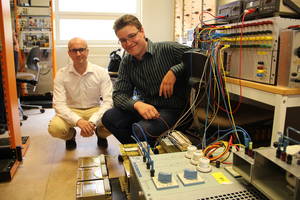Degree project increases safety in nuclear power plant
From now on, the risk of disruption in nuclear power plants is lower, thanks to a degree project by students Anton Christensson and Erik Lingärde at the Division for Industrial Electrical Engineering and Automation at Lund University’s Faculty of Engineering.
– Published 9 September 2014

In the laboratory, the students studied the impacts of open phase faults on the primary side of transformers where the secondary side supplies different types of load objects, which will facilitate the detection of phase failures in the future.
The background to the research is an electrical malfunction in the form of series faults in the Forsmark nuclear power plant on 30 May 2013. On that occasion, Forsmark 3 lost its usual electricity supply for approximately 20 minutes. Instead, the facility ran on electrical power from diesel generators. These should have started automatically, but the automation did not work, meaning that manual intervention was required.
The idea of the degree project was to try to understand what actually happened, in order to prevent a repeat incident in the future.
The experiments showed that the various transformer connections can be roughly divided into two different groups with similar results, but which, between them, produced very different phenomena.
“The load composition was shown to have a major impact on the degree to which lost phases are energised, with induction motor load in general contributing to a greater degree to energising the lost phases than pure resistive load”, says Olof Samuelsson, who supervised the degree project at LTH together with Francesco Sulla.
Representatives from all the Swedish nuclear power plants visited the Faculty of Engineering in connection with the presentation of the degree project.
“We intend to use the results of the degree project to verify the theoretical analyses we have carried out. These will enable us to decide what measures we need to take in order to detect this type of fault,” said Fredrik Heyman, unit manager for electrical engineering at OKG in Oskarshamn.
